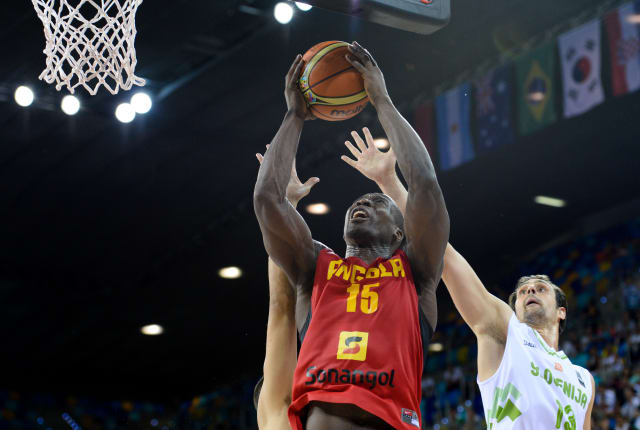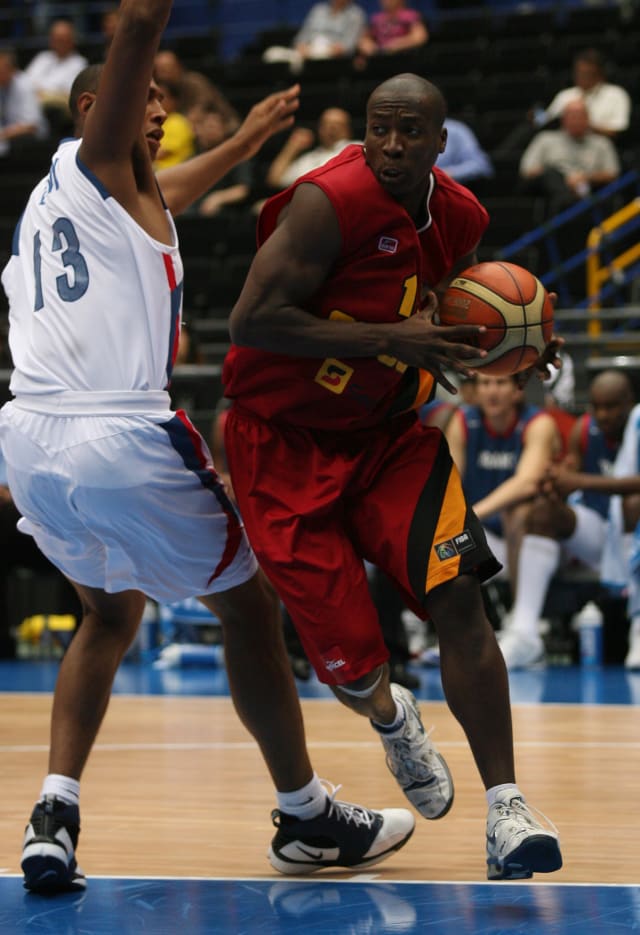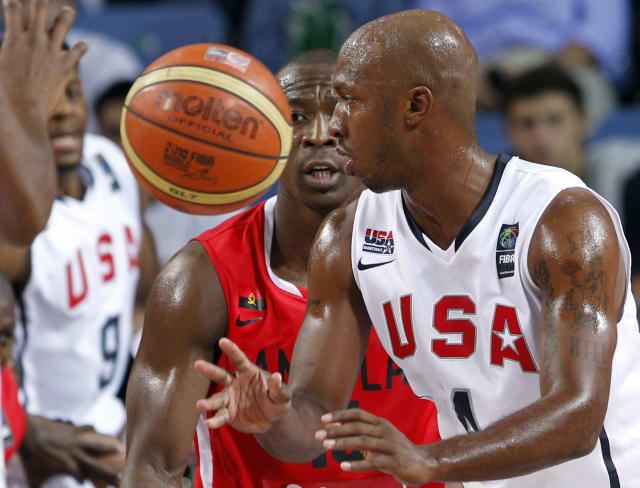Angola's Eduardo Mingas tells tale of his 4 World Cups and bid for a fifth one
Angolan international Eduardo Mingas made his FIBA Basketball World Cup debut in 2002 and hasn't missed one since. He's hoping to join elite company by playing at a fifth one in China
LUANDA (Angola) - Angolan international Eduardo Mingas made his debut at a FIBA Basketball World Cup in 2002 and hasn't missed one since, a feat that puts him in a very select group.
Along with Argentina great Luis Scola as well as the Brazilian trio of Alex Garcia, Anderson Varejao and Leandro Barbosa, Mingas is one of five players who saw their relationship with FIBA's flagship competition begin in Indianapolis, USA, 17 years ago.
Fast-forward to the present day, and each has featured in four World Cups, with a potential fifth on the way.
Mingas spoke to FIBA.basketball to tell his extraordinary story.
"THE 2002 WORLD CUP WAS CLEARLY A TURNING-POINT IN MY NATIONAL TEAM CAREER. I HAD BEEN CALLED UP TO REPRESENT MY COUNTRY BEFORE, BUT IT WAS IN INDIANAPOLIS THAT I REALLY FELT THE MEANING OF REPRESENTING MY COUNTRY INTERNATIONALLY."
Mingas, who turned 40 on January 29, continues to go from strength to strength.
As one of few players that are active for his national team in his late 30s and early 40s, he helped Angola in the African Qualifiers clinch the country's place at the first World Cup to be staged in China, one that will feature a record 32 teams.
With basketball's biggest competition just months away, these five players all stand on the verge of joining Daniel Santiago and Jerome Mincy of Puerto Rico, Maciel Ubiratan and Marcelinho Machado of Brazil and Phil Smyth of Australia as those that have played at five World Cups.
Following the retirement of his fellow Angolan Joaquim Gomes last year, Mingas stands as the lone active African player with four World Cups under his belt.
 Mingas in action against Slovenia at the 2014 World Cup in Spain
Mingas in action against Slovenia at the 2014 World Cup in Spain
Mingas took time out of his busy club schedule with Angolan champions Primeiro D'Agosto to to recall how he took up basketball, relive some of the turning points of his career, share what it feels like to have four World Cups to his name and what drives him to keep going.
I was born in Saurimo in Angola's northeastern province of Lunda Sul. Like most young boys of my age in Saurimo, I dreamed of becoming a professional footballer. Even now, I still believe that I am better at football (soccer) than I am at basketball.
However, opportunities to realize my football dreams never materialized mainly because sports in Angolan provinces still lag behind compared to the capital Luanda.
When an InterClube associate visited Saurimo and heard of my basketball talent, he promised to send me to Luanda where I would have opportunities to develop my basketball skills. But my parents didn't like the idea of seeing me leave the family home.
My intuition spoke louder than my parents' strict discipline and I had no choice but to run away from home to join InterClube in Angola's capital of Luanda in 2000 when I was 20. Eventually my new club and my parents would come to agreed that basketball was, in fact, my future.
It didn't take long before the Angolan Basketball Federation's coaches and scouts heard about me and I started to get the first national team call-ups.
To cut a long story short, two years after leaving my native Saurimo I made my FIBA Basketball World Cup debut in Indianapolis. The year was 2002.
As one of the few non-Luanda natives, I never felt underestimated. On the contrary I felt fully integrated and welcomed.
As a young boy I used to hear that in order to become great you have to play against the best teams. And the best players and teams always played at World Cups and Olympic Games. These two competitions clearly shaped me as a player and as a man.
The 2002 World Cup was clearly a turning-point in my national team career. I had been called up to represent my country before, but it was in Indianapolis that I really felt the meaning of representing my country internationally.
That's why I consider Indianapolis 2002 as my best World Cup experience.
I was one of the youngest players on the team. At 21, Kikas (Joaquim Gomes) was the youngest one. But as the newest member of a team filled with veterans like Angelo Vitoriano, I automatically knew I would face having limited playing time.
Coach Mario Palma was aware of my desire to play and he warned me to be ready as I could be called at any time. With some of our veterans getting in foul trouble, I made my World Cup debut against Yugoslavia.
At the end of the day, I was pleased with my performances in Indianapolis, especially because I helped my country make it to the knock-out stage. I also knew that if I continued to work hard, my opportunities to represent Angola would become more regular and that's what I have been doing for the past 17 years.
My first reaction when I got shortlisted for the World Cup 2002 was 'Wow, I will be able to play against the USA', which was made up of NBA players.
It was a dream of mine to play against the USA because I could only watch them play on TV. At the time, American NBA players were my heroes and idols and I was truly excited by the prospect of playing them.
Unfortunately Angola and the USA were drawn in different groups, and we didn't get the chance to play them in the Second Round.
But the positives about this was that we got the chance of playing Yugoslavia, who had a number of world-class and NBA players like Dejan Bodiroga, Pedrag Stojakovic and Vlade Divac.
And to make it even more special, we faced Spain's golden generation - Pau Gasol, Juan Carlos Navarro, Felipe Reyes and others. Very few observers gave Spain a chance, but they did a terrific job in Indianapolis, and it came as no surprise that they would go on to win the 2006 FIBA Basketball World Cup.
 Mingas goes up against France's Boris Diaw at the 2006 World Cup in Japan
Mingas goes up against France's Boris Diaw at the 2006 World Cup in Japan
After a disappointment of not playing the USA in Indianapolis, my dream came true two years later at the Athens Olympics.
Facing the likes of Allen Iverson, Dwyane Wade, LeBron James and Tim Duncan was an experience I will cherish for the rest of my days.
By the time we faced the USA again at the 2010 World Cup in Turkey I was a more experienced player. And although the tournament was my poorest World Cup performance, I learnt a lot from that. I was disappointed because I was unable to help Angola to the best of my abilities. But one day, I will tell my children - and I hope they will be proud of me - that I played against world-class players like Kevin Durant, Russell Westbrook and Stephen Curry.
One way or another, the Americans will remain in my mind, and losing 121-66 against the Durant-led side was my worst defeat against a USA team.
It's a great feeling looking back in time and realizing that the 2010 World Cup played a significant part in the development of today’s superstars like Durant, Curry and Westbrook.
At the time, they were young but highly-talented. Yet, the Americans managed to win the 2010 World Cup without playing with superstars like James or Wade.
 Mingas defends against USA guard Chauncey Billups at the 2010 World Cup in Turkey
Mingas defends against USA guard Chauncey Billups at the 2010 World Cup in Turkey
In 2014 I made my fourth World Cup appearance, and the lessons I keep from it is that I became a better player year after year. That's one of the positives from my World Cup experiences.
Obviously I had to combine my international competitions' experiences with hard work. I am still an active player thanks to the experience I gained in World Cup and Olympic Games.
One of the questions I hear quite regularly is 'how can I face taller and heavier players in the painted area?'
Well, as a 1.99m (6ft 6in) power forward-center, I am far from being considered a tall big-man.
However, in order to overcome my disadvantage I scout and explore my opponents' weaknesses. Some of them might the most talented players on earth, but somehow they present a weak point, and that's the answer to my 'undersized physique'. I have always played taller and heavier players than me, but this has never put me off.
Being one of the few active players with four World Cup appearances doesn't make me better or superior to anyone else. Obviously it's a huge accomplishment and I feel proud of it, but I have never, ever, felt any sort of vanity for being Africa's only active player with four World Cups appearances.
If I am honest, my age doesn't bother me at all. It is just a number. I feel great playing basketball at the age of 40, and I'll continue to play until my body tells me to stop.
My goal is to finish my international career at the World Cup. I keep working to deserve a call-up from our national team head coach. If I am selected, it will be the biggest award for my career. If I am not selected, that's fine and I will always feel proud of my national team dedication.
congrats to Eduardo Mingas, MVP of 2014 @FIBAAFRICA champions cup for men #tunis2014 @FIBA pic.twitter.com/5CCZWEnFXg
— Africa Basketball League (@AfricaLeague) December 21, 2014
A lot of people seem curious about my career's longevity, but I am just a normal guy.
I have never had any special restrictions in my eating habits. I feel blessed for having my physique. I eat almost everything and anything. And this causes me a lot of trouble with my wife. She insists that I should lead our children by example and I try my best to follow her advice.
But when it comes to working, I always try to work twice as hard as my teammates and opponents.
D'Agosto are the 2018 Unitel Basket CHAMPIONS
— Angola Basketball (@AngolanBasket) June 5, 2018
Eduardo Mingas MVP
🏀🏀🏀 🇦🇴🇦🇴🇦🇴 👏👏👏@unitelao @AngolanBasket @FIBAACC pic.twitter.com/A7898rdIdV
I cannot think of any special advice I would give to younger players who dream of becoming professional basketball players and represent the national team. My number one recommendation to them would be to love the game of basketball. Then they must work hard, be humble and coachable. As long as they keep working hard they will be able to achieve their basketball ambitions.
By Eduardo Mingas